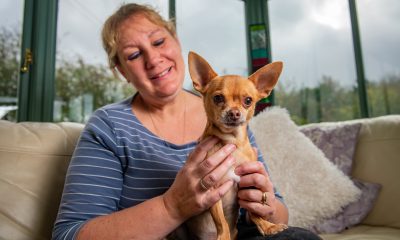Why this mom banned strollers, shoes and high chairs
She said: "Mothers are criticized no matter what they do, especially online."
Published
2 years ago onBy
Talker News
By Charlotte Penketh-King via SWNS
A mom has defended her unusual parenting rules: Banning strollers, learning to swim, high chairs and even shoes.
Alex Tucker, 25, has introduced several "controversial" rules for parenting her toddlers, Berkley, two, and Freya, one, in their rural environment.
The toddlers don't use high chairs or strollers. Instead, they walk on 5-mile hikes.
Alex doesn't enforce any structured play or sign up for any weekly commitments like playgroup.
Her children do not go to daycare so Alex either takes them to work on her boat with her and her boyfriend Paul, or they simply don't go to work.
Alex, from New South Wales, Australia, refuses to teach her children to swim, despite living on the waterfront, and they don't wear shoes.
After sharing her rules online, Alex received plenty of criticism from other parents with one commenting that social services should be called.
But she has defended her rules.
She said shoes distort feet shape, and strollers and high chairs are not essential to their way of living.

Defending her choice not to give them swimming lessons, she said they would encourage her water-fearful kids to get into dangerous water to swim.
Alex, who works in the fishing industry with her boyfriend Paul and lives on the Hawkesbury river, said: "I'm not bothered by people who don't agree with my 'controversial' rules.
"Mothers are criticized no matter what they do, especially online.
"That’s why it’s important to share the 'controversial' things.
"I'm opening the conversation for everyone to start thinking outside the box before straight up criticizing someone’s parenting when they don’t know how different someone’s lifestyle can be.
"I'm not preaching 'my ways' this isn't a 'how to' manual. This is what works for our family."
Alex's children roam barefoot across the beach, on pavement and even on their 5-mile family hikes but the mom insists going without shoes is better for her kids.
Alex said: "It sort of shocked me that that was a big issue to a lot of people.
"In Australia, it’s pretty normal to not wear shoes unless you are at the shops or school or work.
"Even then, if you are from a coastal town like us, it’s normal to not wear shoes at the shops, and working on boats, it’s also common to not wear shoes."

"A big factor of that is muscle and joint development. It’s no secret shoes change posture and foot shape so I figure why distort their natural development when shoes just aren’t necessary most of the time?
"Shoes serve a purpose, like if the ground is too hot or too cold, or if snakes and wildlife are a valid threat, or if something hurts to walk on.
"For the most part, they are just not things we deal with in our daily life, so the kids don’t wear shoes.
"When you don’t wear shoes, your feet do often toughen. You do learn how to walk on rough surfaces, and being a small coastal town Aussie, that’s just our way of life."
Alex's boyfriend Paul owns a fishing business and Alex, who has experience working as a fisherman and commercial captain, often helps on the boat when he's in need of extra crew members.
The couple usually take their kids along to work and Paul cares for them by himself if Alex is needed to help on another boat.
If the weather conditions are too bad for the children to join Paul on the boat and Alex is busy, the dad will miss his day of work entirely rather than send their kids to daycare.
Alex said: "We are a rural family working in primary production - I am a stay-at-home mother out of necessity, like most rural mothers.
"I'm needed at home for more than childcare and housework - we are the people at the frontline of feeding the nation.
"If it is not a desirable day for them to come to work, one parent stays home, that’s rural life."
Parents online were quick to point out that knowing how to swim could save her kids' lives should they end up in the water alone. But Alex has said there is a strong difference between water safety and swimming.
"Swimming lessons was a difficult one to decide on, but I came to the conclusion that a toddler probably couldn’t swim out of the river on their own.
"In the river here, currents and submerged objects are a huge factor for drownings, and while they have a healthy fear of the water, I won’t encourage them to enter it by doing swimming lessons.
"We play by the river a lot, and when a toy falls in, they freak out and come ask me to get it.
"If my eldest has a life jacket on, he will very hesitantly walk in knee deep to get into a boat but refuses to go further - frankly, I want to keep it that way until they are big enough to understand how to swim out of a current.
"I'm less concerned with driving three hours to put my toddlers into swimming lessons so they can swim around a pool, when in reality, that's not actually going to help our situation.
"For now I want floating to be their only instinct if they were to somehow fall in.
"I don't want them to think of swimming as something fun that people do, at least not at this age."

Despite the backlash from parents online, Alex has no regrets about sharing her alternative parenting techniques and hopes she has opened up a conversation about rural parenting.
"I don’t know that I’d call them rules, it’s just how we are doing things right now because it does work best for us, so I don’t regret sharing them at all!
"I’m actually happy that I got to see some comments like 'oh I’ve never thought about it like that, makes sense.'
"All toddlers are different, but as long as they are happy and healthy - they are where they should be."
Stories and infographics by ‘Talker Research’ are available to download & ready to use. Stories and videos by ‘Talker News’ are managed by SWNS. To license content for editorial or commercial use and to see the full scope of SWNS content, please email [email protected] or submit an inquiry via our contact form.
You may like


She sold her car to help pay for her chihuahua’s life-saving surgery


Dancer paints artworks with her body that sell for thousands


Man traveled to 10 countries in 24 hours using only public transport


Potterhead parents reveal baby’s gender using Sorting Hat at Universal Studios


She loves Christmas so much she turned her home into a gingerbread house


Golf fanatics tie the knot in wedding themed around their favorite sport
Other Stories


New breakthrough treatment boosts cancer-fighting cells
The approach involves activating the immune cells in the body and "reprogramming" them to attack and destroy the cancer cells.


One-year-old can’t stop laughing during first ride at Disneyland
"We didn't expect him to love it that much."


Dad running marathon wearing chainmail weighing over 40 pounds
A dad is attempting to break the world record for the fastest marathon while wearing chainmail.


Hero saves elderly couple by dragging them out of burning car
The Good Samaritan jumped into action after spotting the fire on his way to work.


Bomb squad seals off town after ammunition shell donated to charity shop
Staff discovered the device in a bag of donations.
Top Talkers

 Parenting2 days ago
Parenting2 days agoSingle mom details struggles of feeding her 12 kids

 Broadcast4 days ago
Broadcast4 days agoOver 40% of Americans have no clue what a 401k is

 Broadcast3 days ago
Broadcast3 days agoHow hard is it for Americans to live sustainably?

 Broadcast1 week ago
Broadcast1 week agoGrocery shopping hungry is costing Americans this much

 Funny1 week ago
Funny1 week agoCops confused by crow mimicking police siren

 Shopping1 week ago
Shopping1 week agoGrocery shopping hungry costs Americans this much every trip

 Money4 days ago
Money4 days agoOver 40% of Americans have no clue what a 401k is

 Parenting1 week ago
Parenting1 week agoIt takes this many minutes for the average American kid to get bored
